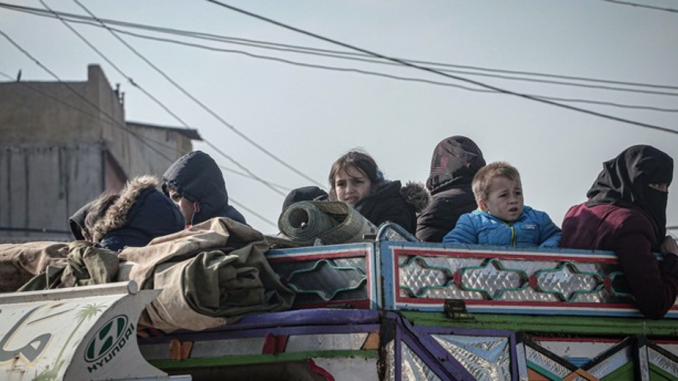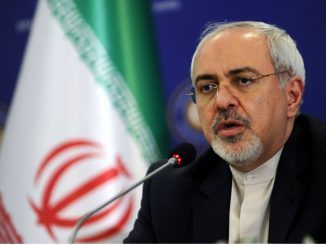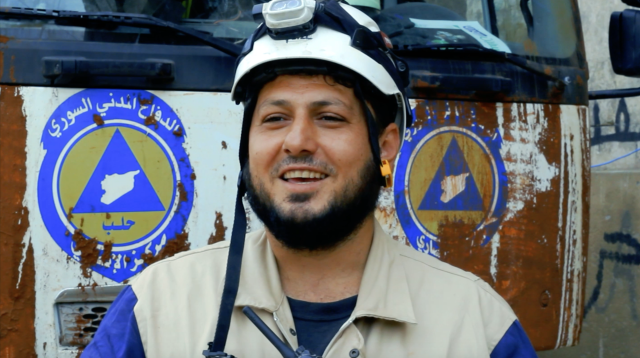
Around 90,000 more civilians headed toward the Turkish border in the past four days, the Syria Response Coordination Group said Friday.
The civilians are fleeing as a result of attacks by the Bashar Assad regime and Russia in the de-escalation zone in the northwestern Idlib province, Anadolu Agency reported.
Turkey has been urging Russia to ensure that the regime abides by the terms of the Sochi and Astana agreements to prevent a humanitarian catastrophe.
On Thursday, the U.N. envoy for Syria warned that a humanitarian crisis is unfolding in the northwestern province.
Turkey, as the country hosting the largest number of Syrian refugees in the world, has long been striving to achieve peace and stability in the country, calling on international actors to take action against the humanitarian disaster that is unfolding there each day.
Turkey has also frequently warned other countries of a new refugee wave that would happen if relentless attacks on the de-escalation zone continue.
Most recently, Syrian regime forces entered the strategic town of Saraqib in the northwestern Idlib province, in a renewed push by Assad to recapture the last opposition stronghold despite Turkey’s warnings to pull back its forces from Turkish-manned posts.
Assad’s campaign to regain Idlib province has sparked a new exodus of thousands of civilians toward the border with Turkey, which backs some opposition groups fighting Assad.
The mass displacement of civilians in Idlib – one of the largest since the 2011 start of the conflict that has displaced more than half of Syria’s prewar population of 20 million – has coincided with a biting winter. The renewed fighting is taking place despite a Jan. 12 cease-fire deal between Turkey and Russia, which back opposing sides of the conflict.
Turkey promises firm response to Syrian regime attacks
Turkey took necessary measures to prevent further regime attacks in northwestern Syria’s Idlib and is ready to respond to any aggression, Defense Ministry warned yesterday.
“Observation points will continue to operate,” the ministry added, emphasizing that the coordination with Russia continues without problems on the ground.
The deadly attacks in Idlib province killed seven Turkish soldiers and one civilian contractor working with the Turkish military earlier this week.
“Our priority is providing a cease-fire in Idlib. We are taking the necessary steps in this direction and continue to do so. We have reinforced our troops to secure our observation posts,” security sources said.
The sources also confirmed that due to the regime attacks, three observation points in the region – point seven, eight, and nine – are currently under siege by regime forces.
Although Ankara and Moscow agreed to stop acts of aggression and turn Idlib into a de-escalation zone, the regime and Russia have consistently violated the cease-fire, launching frequent attacks inside the de-escalation zone.
As a guarantor state for Damascus, Russia is responsible for preventing attacks by the Assad regime and Iran-backed militia groups, which have repeatedly violated last year’s Sochi agreement between Ankara and Moscow.
Syrian regime forces have continued to pound Idlib as part of an offensive that has killed 300 civilians since December and displaced 520,000 people.
Russian delegation to arrive in Ankara to discuss Idlib
In the wake of the regime’s attack on Turkish troops in Idlib, Syria, a Russian delegation is expected to arrive in Ankara on Saturday to discuss the escalating situation, Turkey’s foreign minister said on Friday.
The announcement by Mevlut Cavusoglu came at a joint news conference in the capital city with his Slovakian counterpart Miroslav Lajcak.
Earlier this week, Syrian regime forces attacks killed seven Turkish soldiers and one civilian. In retaliation, the Turkish military targeted more than 50 positions and neutralized over 70 regime troops, according to Defense Minister Hulusi Akar.
Cavusoglu said Turkey, which hosts over 3.6 million Syrian refugees, and Russia, will work closely to resolve the crisis.
Asked about the latest developments in the strategic city of Saraqib, east of Idlib, Cavusoglu said the situation there remained critical as attacks by the regime continue.
Owing to the ongoing attacks hundreds of thousands of civilians had been displaced, he said, adding that despite agreements in Sochi and Astana, the regime’s aggression had risen. “The benefits of the deals are yet to be seen,” he said.
The foreign minister said that Ankara will go all out in its efforts to ensure a permanent cease-fire and prevent a humanitarian crisis in Idlib — the last stronghold of opposition forces in the war-torn country.
On Thursday, Russia-backed Syrian forces advanced through Idlib province in a brutal ground offensive that was preceded by weeks of intensive aerial bombardment. This has terrified the civilians who have left their homes for shelter to safe havens.
Since March 2011, hundreds of thousands of Syrians have been killed by the regime and millions have been displaced, besieged and denied humanitarian and medical aid.
In 2017, Turkey, Russia and Iran held meetings in Astana city of Kazakhstan and announced that Idlib and neighboring cities in the Eastern Ghouta region outside the capital Damascus, and the southern cities of Daraa and Quneitra would be de-escalation zones.
But the Assad regime and Iranian-backed terrorist groups launched attacks in violation of the agreements, and thanks to Russian air support, gained control of these territories with the exception of Idlib city.
Later in September 2018, Turkey and Russia agreed in Sochi to turn Idlib into a de-escalation zone where acts of aggression are expressly prohibited.
The Syrian regime and its allies, however, have consistently broken the terms of the cease-fire, including a fresh truce on Jan. 12, launching frequent attacks inside the zone and killing at least 1,300 civilians since then.



